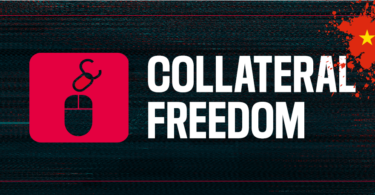Internet access can become a scarce luxury when reporting in conflict environments, and having a means of communication is vital for a journalists’ safety. Mesh messaging applications use bluetooth to send short range off-the-grid messages while offline, and could one day be a reporter’s lifeline.
During the most critical of times, when reporting in a war, civil unrest or a natural disaster, a journalist risks being isolated due to internet outages or weak phone signals. In these instances, mesh messaging apps -that use the phone’s built-in bluetooth antenna to send off-the-grid messages while offline- can be a useful solution.
Mesh messaging apps send and receive text messages to other phones that are located in the vicinity and use the same software. The devices with the same mesh messaging app form a chain that relays the message until it reaches its final destination. This is called peer-to-peer networking. Messages sent through a mesh network are end-to-end encrypted, meaning that senders remain anonymous and the messages can’t be deciphered by intermediaries. However, senders should always be cautious of possible hacking, or the receiver’s phone.
As mesh messaging apps also allow mass dissemination of messages within the same network, they were widely used during the Hong Kong protests in 2019 and 2020, allowing protesters to evade censorship as well as online monitoring.
Pros
- Private offline communication.
- Circumvents internet service providers (ISPs), cell and Wi-Fi networks, or any other government-controlled infrastructures.
- Decentralised and difficult to shutdown completely.
- Most useful in protests, natural disasters, warzones, when camping or trekking in forests and jungles.
Cons
- Only works if there is a sufficient density of phones with Bluetooth on and using the same mesh application.
- Bluetooth is very energy-consuming and can drain the batteries of devices.
- Bluetooth is only effective in a range of about 100m (328 feet) and has trouble moving through dense objects.
- Some mesh messaging apps need user contact information for registration which would be transmitted through ISPs.
- Mesh messaging apps are relatively new and their features are still developing.
Recommended Apps
- Briar. An open-source security-focused messaging app designed with the needs of journalists and activists in mind. The app only saves the user’s contacts in the device but encrypts it to eliminate any chance of external access. Available for Google and Android phones.
- Bridgefy. Free app, encrypted with the same end-to-end encryption system as Signal. It requires initial registration when first signing up, which could be a risk for those who want to remain anonymous.
Not Recommended
- FireChat. One of the more well-known mesh messaging apps, it was shut down in 2018. It is not recommended to use discontinued apps due to the risk of security breaches.
Written by Benjamin Finn. From Houston (USA), Benjamin has been in the IT field for a decade, during which his primary focus was the deployment of internal security tools across large enterprises. Over the last two years, he has been researching on how to maintain proper security in the context of an oppressive nation-state, specifically in the context of Myanmar. He has also been working with multiple groups in Taiwan to train them on proper security and safety measures.
This article is part of a series on messaging apps:





